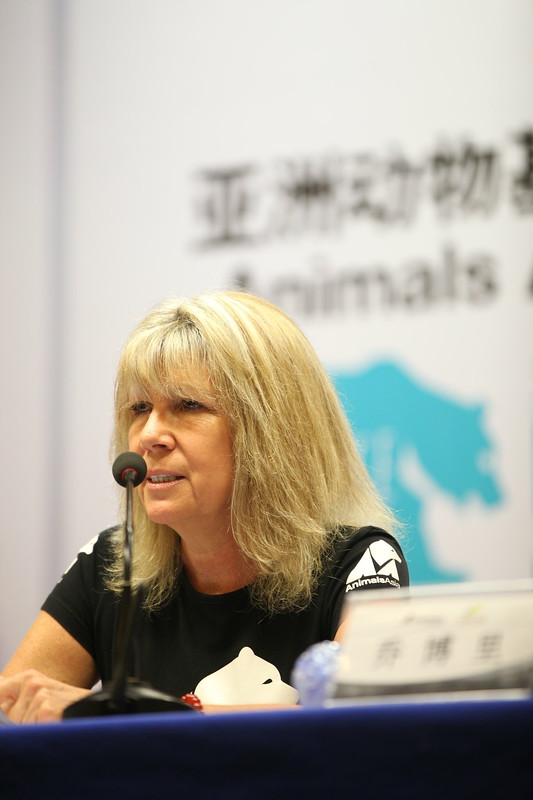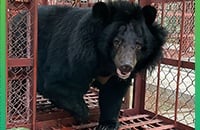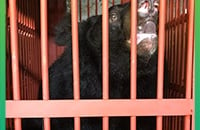Report: Farmed bears aren’t farmed - they’re trafficked
22 August 2014
-1.jpg) A key report from wildlife trade monitors, TRAFFIC, has outlined the extent of bear trafficking in Asia – a situation worsened by the existence of bear bile farms.
A key report from wildlife trade monitors, TRAFFIC, has outlined the extent of bear trafficking in Asia – a situation worsened by the existence of bear bile farms.
The report, funded by funds entrusted to Animals Asia by The Myer Foundation and the estate of Elsie Quinn, is based on research into 12 years of activity across 17 countries, representing almost 700 seizures, accounting for 2,801 bears. Among the findings is the fact that bear bile farms, that were once thought would stop bears being taken from the wild, has instead boosted trafficking and markets for bile products.
Brought to Bear: an Analysis of Seizures across Asia (2000–2011) states:
“The production of bile in farms increases the availability of bear bile and intensifies consumer demand. The supply pressure for facilities to stock adequate numbers of bears to meet demand for bile extraction subsequently drives the poaching of bears from the wild. Proponents of ‘bear farming’ claim it alleviates pressure on wild bear populations although there has been no conclusive evidence supporting the efficacy of ‘bear farming’ and no identified beneficial effect on wild populations. Furthermore, this terminology is potentially misleading because ‘farming’ typically insinuates practices where animals are bred in captivity.”
It continues:
“Given that bears are essentially not bred in captivity and that bear bile extraction facilities mostly source their animals from the wild, the notion of sustainably ‘farming’ bears to supply bile and bear parts is highly flawed. It is suspected that in border provinces where a greater number of live bears were seized (such as in Cambodia; 156, Lao PDR; 26 and Thailand; 15) were potentially en-route to bear bile extraction facilities in Vietnam and China.”
Animals Asia founder and CEO Jill Robinson said:
“This clearly endorses our own investigations and research. Bear farms are not, in any way, ‘saving’ bears. Increasingly the bears we are rescuing in Vietnam are the ones being trafficked between neighbouring countries and are headed to bile farms domestically or in China. There is no evidence of bears being bred in captivity in Vietnam and breeding, while more widespread in China, is still the preserve of the industrial bile farmers. These are also the farmers with the largest resources to create markets for ever more spurious bile products.
“Furthermore we must not overlook the animal welfare issues. Bears, farmed or trafficked, are no less susceptible to the pain and cruelty of bear bile farming. However we judge the bile farms, they have failed and are failing. They have not ended trafficking and they are not extracting bile in a humane way. There is no humane way. The only humane course of action is to end bear bile farming.
“On a more positive note the seizures documented, over more than a decade, also run parallel to an incredible emergence of environmental awareness in Asia - particularly in China. Increased prosperity may have grown markets but I believe that is being countered by increased environmental education and especially increasing support against bear bile farming."
Amongst the reports suggestions are that all countries involved should consider the implementation of sustained education and awareness campaigns as a measure to help eliminate illegal trade.
Also, research should be conducted to identify suitable alternative substitutes for bear bile and promotion of alternatives should be communicated to bear bile purchasers and users from medical professionals.
In addition, advocacy campaigns should be undertaken widely encouraging traditional medicine practitioners to ensure bears feature on lists that they are not permitted to work with.
Jill Robinson added:
“This is an extremely valuable document. We are indebted to TRAFFIC for their diligence and have been delighted to assist this key publication. We must also pay tribute to the hard work and commitment of enforcement authorities across Asia for their on-going dedication to ending illegal trafficking.”
BACK






 Freedom after two decades: Moon bears Nang and Mua rescued
Freedom after two decades: Moon bears Nang and Mua rescued
 With heavy hearts we say goodbye to our beloved Tulip
With heavy hearts we say goodbye to our beloved Tulip
 Three moon bears rescued from notorious bear bile farming hotspots in Vietnam
Three moon bears rescued from notorious bear bile farming hotspots in Vietnam
